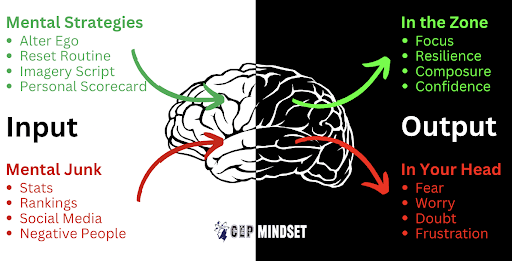
If you know your mental game matters and you are actively training your mind to be confident, resilient, and dialed in, then don’t forget that you also need to be filtering out the mental junk.
I see this all the time where someone is doing all the right things to train their mind, but they are not protecting their mind from all the negative factors.
It is like being on a workout program and eating healthy food, but then having 3 donuts everyday.
Your input dictates the output.

A big part of the problem is you probably can’t avoid all of these negative inputs. So you need to learn how to filter them.
Here is how to protect your mind from the 3 worst forms of mental junk:
1. Stats, Rankings, or Any Other Result
This one is commonly the most destructive. I recently did a whole post on how to stop obsessing about results and why traditional goal setting is often holding athletes back.
Stats are not inherently bad. They are just a form of feedback.
The problem becomes when you obsess over them.
It’s okay to set goals and have intentions about stats, rankings, or any other results.
The mistake is when you start to confuse why you play the sport with your goals and intentions.
When you look at your stats, rankings, or any other results too frequently, you are telling yourself that the results are your top priority.
The solution is not to completely avoid results.
Instead, the solution is to create habits and filters to help you detach from the results and stay immersed in the process.
Here are some of the more common strategies I have my athletes follow:
- Limit Looking at Stats
Check stats online once a month at the most (some athletes do so as little as once every 3 months). - Manage Your Inner Circle
Tell close friends and family to stop discussing stats. - Deflect Discussion about Results
When other people bring up stats to you, either: a) shrug it off and switch topics or b) use it as a reminder to double down on what matters most to you – your process. - Create Your Personal Scorecard
Give yourself something else to obsess about that is more within your control instead of results. - Personalize Your Pre-Game Routine
Be intentional about what you do on game day. Replace any predictions with the acceptance of a range of results – cue your Reset Routine.
2. Social Media
Social media perpetuates the results trap and creates a whole other set of problems, distractions, and mental junk.
I’d like to say just remove all social media but I’m pretty sure no one will follow that advice.
So instead, think of social media as a form of entertainment. Entertainment is not inherently bad. But how much entertainment matters.
Let’s tie it back to the diet and donut analogy – a donut here and there isn’t so bad. But when you have 3 donuts a day everyday, now you have a problem.
The reality is most athletes have a problem with social media. They have become addicted and they are not in ‘control’ of how much entertainment they are consuming.
There are countless articles highlighting the negative effects of too much social media, but here are the worst negative impacts as they relate to your mental performance, let alone your mental health:
- Decreased Focus, Productivity, & Ability to be Present
Too many people leave their notifications on and they end up with pings and buzzes all day long. Most athletes have over 100 notifications and pick-ups per day – which distracts them from the task at hand, they toggle back and forth, and decreases productivity. It also hinders meaningful conversations when in-person with others. - Fear of Missing Out and Unhealthy Comparisons
Scrolling through the superficial posts that don’t tell the full story can create problematic narratives in your mind. You feel like your life is not as interesting as others, fear you are missing out, or feel you are inadequate compared to others – which is not true. - Compounding Negative Effects
The more time you spend on social media per day means the less time you can spend on other important factors like: sleep, training, being in nature, in-person human interaction, or school work… etc. These things often start to compound onto each other – creating a cycle of procrastination and unhealthy coping mechanisms.
This is not about scaring you into decreasing social media time. The intent here is for you to become more aware of the impact of social media on your mind, habits, and overall well-being. Then, for you to decide what the right amount of entertainment is for you.
The end goal is that you create a system and structure to prevent your social media from being a toxic and unhealthy addiction.
The good news is there are accounts on social media – like ours – that can be educational, practical, and helpful. So a good strategy is to be mindful of who you follow and regularly unfollow accounts that are adding unnecessary mental junk.
Additionally, here are a few resources that can help you create a healthier relationship with social media:
- The 4 Steps to Break Phone Addiction video I made a few years back
- The Social Dilemma – Movie on Netflix
3. Negative People
If you have supportive parents, friends, and agents as well as a team with a healthy culture then this won’t apply to you as much.
Unfortunately, there are a lot of negative people causing a lot of problems in sport. We have covered a few of the issues in our Beyond the X’s and O’s podcast here:
- Declaration of War Against the ‘Old-School’ Coaching Mentality
- Is Hockey Broken? Which wasn’t just about hockey.
- The Leaders of Sport are Failing
As such, many athletes need to develop strategies to cope with their challenging situations and filter the negative people around them. Here are the some of the top strategies I recommend:
- Accept It & Prepare for It
No matter how negative the situation or the people, you can either fight it or accept it. Acceptance doesn’t mean you have to tolerate it, stand for it, or do nothing about it. It means you understand that other people are human. If you can’t avoid the negativity and you know it is coming, then you can be well prepared for it. This is coping planning in a nutshell. For example, I had a professional hockey player that was in a toxic environment. So we created an Alter Ego where they put on an imaginary hazmat suit as if they were walking into Chernobyl. This created the mental filter to deal with all the negativity. - Use it to Your Advantage
This strategy is about flipping the script. Instead of focusing on how the negativity is hurting you, what if you framed it as something that can serve you. For example, it can serve as a reminder of what you don’t want to do, helping you dive deeper into your mental game. Additionally, you can use coaches or someone that doesn’t believe in you as rocket fuel. Don’t let it become your main source of motivation, as you need to be able to rise above the noise and stay connected with the love of the game. But the drive to prove others wrong can be a powerful force that ends up serving you well. - Know That You Have a Choice
You need to remember that you always have the option to leave the environment and sometimes this is the best choice. Additional options you should understand and consider include: calling the person out to their face, going above or around the negative person – take it to your parents, the coaches, the organization, the league, the newspaper, heck, join our BXO podcast if you want. Although you might not want to take any of those options, the fact of knowing they are there gives you a sense of power to know you have choices and that you are in the right to speak up and take action if you really want to.
________________________________________________________________________________________
The bottom line is your input dictates your output.
Every athlete needs to learn how to manage their environment and filter their mental junk so that it doesn’t contaminate the fruits from their mental training.
In summary, follow these three steps to effectively filter worst forms of mental junk:
1. Minimize the attention you give to stats so you can stay detached from results and immersed in the process.
2. Be mindful and intentionally manage your use of social media.
3. Overcome negative people by preparing for them, flipping the script and remembering that you have a choice.
I hope you found this helpful.
Please share this with anyone you think would benefit from this post.


 Nicholas Santino is a Senior High-Performance Coach, PhD Candidate, and the official Mental Performance Consultant for Elite Prospects. From his specialized psychology research program, to his PhD studies, Nicholas has gained a tremendous foundation of knowledge and appreciation for the human experience. His passion for psychology has accumulated to a commitment to studying and applying positive psychology and stoicism. This commitment has led Nicholas to conduct many research studies focusing on understanding why and how some people thrive and prosper while others do not. His admiration for evidence-based solutions has propelled Nicholas to produce studies revolving around mindfulness, grit (perseverance and passion), performance, quality participation, social relationships, and well-being.
Nicholas Santino is a Senior High-Performance Coach, PhD Candidate, and the official Mental Performance Consultant for Elite Prospects. From his specialized psychology research program, to his PhD studies, Nicholas has gained a tremendous foundation of knowledge and appreciation for the human experience. His passion for psychology has accumulated to a commitment to studying and applying positive psychology and stoicism. This commitment has led Nicholas to conduct many research studies focusing on understanding why and how some people thrive and prosper while others do not. His admiration for evidence-based solutions has propelled Nicholas to produce studies revolving around mindfulness, grit (perseverance and passion), performance, quality participation, social relationships, and well-being. A Native of Quebec, Sara was part of the St. Lawrence University Women’s Ice Hockey team that competed in the NCAA Division 1 hockey league ECAC. During this time, Sara helped her team appear in four ECAC Hockey Tournaments and two NCAA Frozen Fours, and was a four-time member of the ECAC Hockey All-Academic Squad. Following her career at St. Lawrence University, Sara played one year of professional hockey with Lugano, where she truly honed her skills in understanding the intricate connection between mindset and performance.
A Native of Quebec, Sara was part of the St. Lawrence University Women’s Ice Hockey team that competed in the NCAA Division 1 hockey league ECAC. During this time, Sara helped her team appear in four ECAC Hockey Tournaments and two NCAA Frozen Fours, and was a four-time member of the ECAC Hockey All-Academic Squad. Following her career at St. Lawrence University, Sara played one year of professional hockey with Lugano, where she truly honed her skills in understanding the intricate connection between mindset and performance.
 Blair has over 13 years of experience as a Professional Dancer, Assistant Dance Captain & Cast Manager, as well as an additional 17 years of training. Over the last 3 decades, she has lived and experienced first hand the highest of highs & lowest of lows that come with pursuing a career in the Performing Arts.
Blair has over 13 years of experience as a Professional Dancer, Assistant Dance Captain & Cast Manager, as well as an additional 17 years of training. Over the last 3 decades, she has lived and experienced first hand the highest of highs & lowest of lows that come with pursuing a career in the Performing Arts.













